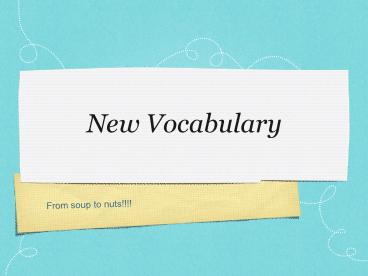New Vocabulary - PowerPoint PPT Presentation
Title:
New Vocabulary
Description:
From soup to nuts!!!! Simple Sentences I love pizza. A simple sentence has a subject (I) and a predicate (love). Compound Sentence I love pizza and I eat at Tony s ... – PowerPoint PPT presentation
Number of Views:35
Avg rating:3.0/5.0
Title: New Vocabulary
1
New Vocabulary
From soup to nuts!!!!
2
Simple Sentences
- I love pizza.
- A simple sentence has a subject (I) and a
predicate (love).
3
Compound Sentence
- I love pizza and I eat at Tonys every Friday.
- A Compound sentence has two independent clauses
( I love pizza) and (I eat at Tonys every
Friday.)
4
Complex Sentence
- I love pizza because it has the freshest dough
and tomatoes. - Complex sentences have at least one independent
clause and one dependent clause. - (I love pizza - independent can stand alone)
- (because it has the freshest dough and tomatoes -
dependent cannot stand alone.)
5
Infinitives
- Infinitives can be used as nouns, adjectives, or
adverbs. to verb - To sleep is the only thing Eli wants after his
double shift waiting tables at the neighborhood
café. - To sleep functions as a noun because it is the
subject of the sentence. - No matter how fascinating the biology dissection
is, Emanuel turns his head and refuses to look. - To look functions as a noun because it is the
direct object for the verb refuses. - Wherever Melissa goes, she always brings a book
to read in case conversation lags or she has a
long wait. - To read functions as an adjective because it
modifies book. - Richard braved the icy rain to throw the smelly
squid eyeball stew into the apartment dumpster. - To throw functions as an adverb because it
explains why Richard braved the inclement
weather.
6
Gerunds
- Gerunds always end in -ing and are always nouns.
- Since Francisco was five years old, swimming has
been his passion. - Swimming subject of the verb has been.
- Francisco's first love is swimming.
- Swimming subject complement of the verb is.
- Francisco enjoys swimming more than spending time
with his girlfriend Diana. - Swimming direct object of the verb enjoys.
- Francisco gives swimming all of his energy and
time. - Swimming indirect object of the verb gives.
- When Francisco wore dive fins to class, everyone
knew that he was devoted to swimming. - Swimming object of the preposition to.
7
Participleverbs that act like adjectives or are
part of a multipart verb phrase
Verb Simple present Simple past Past Participle Present Participle infinitive
giggle giggle(s) giggled giggled giggling to giggle
swim swim(s) swam swum swimming to swim
8
Preposition
- Prepositions are the words that indicate
location. Usually, prepositions show this
location in the physical world. Check out the
three examples below - The puppy is on the floor.
- The puppy is in the trashcan.
- The puppy is beside the phone.
- continued on the next slide
9
lists of prepositions
- about
- above
- according to
- across
- after
- against
- along
- along with
- among
- apart from
- around
- as
- as for
- at
- because of
- before
- behind
- below
- beneath
10
rhetoric
- the art of speaking or writing effectively
- a the study of principles and rules of
composition - b the study of writing or speaking as a means
of communication or persuasion - C skill in the effective use of speech
11
cause and effect essay
- Cause and effect essays are concerned with why
things happen (causes) and what happens as a
result (effects). - Cause and effect is a common method of organizing
and discussing ideas.
12
Memoir/Anecdote
- Memoir is a story about a particular time in a
persons history. - An anecdote can be part of a memoir where it is a
retelling of an event with embellishments to make
the entire story more interesting.
13
Protagonist/Antagonist
- The protagonist is the main character in a story,
novel, drama, or other literary work - the character the reader or audience empathizes
with. - The antagonist opposes the protagonist.
14
Definition essay
- writing that explains what a term means. Terms
such as honesty, honor, or love are abstract and
depend more on a person's point of view. - Three Steps to Effective Definition
- 1. Tell readers what term is being defined.
- 2. Present clear and basic information.
- 3. Use facts, examples, or anecdotes that
readers will understand. - 4. Write what it is not.









![❤[PDF]⚡ Vocabulary Handbook (Core Literacy Library) PowerPoint PPT Presentation](https://s3.amazonaws.com/images.powershow.com/10051499.th0.jpg?_=202406101212)










![[PDF] Pittsburgh Prep Vocabulary Mastery Book One: Become a Master of Vocab Full PowerPoint PPT Presentation](https://s3.amazonaws.com/images.powershow.com/10086691.th0.jpg?_=20240726119)










